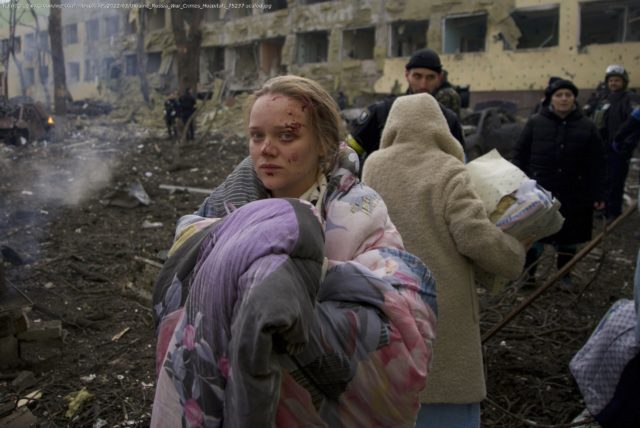LVIV, Ukraine (AP) — For a month now, Russian forces have repeatedly attacked Ukrainian medical facilities, striking at hospitals, ambulances, medics…
LVIV, Ukraine (AP) — For a month now, Russian forces have repeatedly attacked Ukrainian medical facilities, striking at hospitals, ambulances, medics, patients and even newborns — with at least 34 assaults independently documented by The Associated Press. With every new attack, the public outcry for war crimes prosecutions against Russian President Vladimir Putin, his generals and top Kremlin advisers grows louder. To convict, prosecutors will need to show that the attacks are not merely accidents or collateral damage. The emerging pattern, tracked day by day by the AP, shows evidence of a consistent and relentless onslaught against the very civilian infrastructure designed to save lives and provide safe haven to Ukraine’s most vulnerable. AP journalists in Ukraine have seen the deadly results of Russian strikes on civilian targets first hand: the final moments of children whose tiny bodies were shredded by shrapnel or had limbs blown off; dozens of corpses, including those of children, heaped into mass graves. “The pattern of attacks will help prosecutors build the case that these are deliberate attacks,” said Ryan Goodman, professor of law at New York University and former special counsel at the U.S. Department of Defense. “Prosecutors will draw inferences from how many medical facilities were targeted, how many times individual facilities were repeatedly struck and in what span of time.” Deliberate attacks on hospitals will likely be a top priority for war crimes prosecutors. This accounting of attacks on medical facilities is part of a larger effort by the AP and the PBS series Frontline to track evidence of potential war crimes committed during the one of the largest conflicts in Europe since the end of World War II. The War Crimes Watch Ukraine project launched by AP and Frontline includes details of apparent targeted attacks as well as indiscriminate destruction of civilian buildings and infrastructure. The AP/Frontline online database will continue to be updated as long as the conflict lasts. The goal is to provide an independent accounting of events, apart from potentially inflated claims by advocates or misinformation spread by state-backed propaganda. ___ This story is part of an ongoing investigation from The Associated Press and Frontline that includes the War Crimes Watch Ukraine interactive experience and an upcoming documentary. ___ The AP’s own reports include strong visual evidence such as photos and videos, along with witness accounts of alleged atrocities. AP journalists outside Ukraine have confirmed the details of other attacks by interviewing survivors and independently verifying the authenticity of videos and photos from the war zone posted online by local officials and residents. The United Nations High Commissioner for Human Rights confirms at least 1,035 civilians, including 90 children, have died in the four weeks since the start of the war. Another 1,650 civilians have been wounded. Those numbers are certainly an undercount since scores of bodies now lie under the rubble of demolished buildings or were hurriedly buried in mass graves, or the deaths occurred in areas now under Russian control. Still, Russian officials have denied hitting civilian targets, deriding the mounting documentation of atrocities as “Fake News” and claiming without evidence that dead and wounded civilians photographed were “crisis actors.” Speaking at talks in Turkey about a potential cease-fire, Russian Foreign Minister Sergey Lavrov dismissed concerns about civilian casualties as “pathetic shrieks” from Russia’s enemies and denied Ukraine has even been invaded. Military attacks on civilian populations and their property are generally forbidden under international laws governing armed conflicts going back more than a century. Efforts are already underway by the International Criminal Court in the Hague and Ukrainian prosecutors to compile evidence for future criminal indictments. Chief ICC prosecutor Karim A.A. Khan announced last month that his agency had opened an investigation after receiving referrals from 39 nations over potential evidence of war crimes committed in Ukraine. President Joe Biden has said he believes Putin is a war criminal, and the U.S. government has assessed that members of Russia’s armed forces have committed war crimes. Attacks on medical facilities and staff are considered particularly heinous under international law, which stipulates they must be protected. Still, bombing a hospital is not necessarily a war crime. Prosecutors must show that the destruction is intentional or reckless. But the evidence of such attacks in Ukraine verified by AP and Frontline is both mounting and horrendous, and belies Russian claims that they were staged, self-inflicted or militarily justified. Russia is bombing “medical infrastructure on purpose, fighting sick people as if they were military,” said Pavlo Kovtoniuk, a former deputy minister of health and WHO consultant who co-founded the Ukrainian Healthcare Center, a think tank based in Kyiv that has been documenting attacks on hospitals. “Bombing hospitals is especially cruel because it shows civilian people that there is no safe place for them on earth,” he said. Among the most thoroughly documented strikes was the March 9 bombing of a children’s and maternity hospital in Mariupol. Two AP journalists, the last international media to remain in the city after it was encircled by Russian forces, arrived at the hospital minutes after the explosion. They saw a smoldering two-story deep crater in the interior courtyard, surrounded by the twisted and burned remains of several cars.






